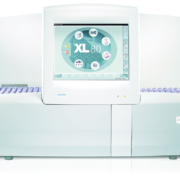Malaria screening in routine hematology
In 2016, 91 countries reported a total of 216 million cases of malaria, an increase of 5 million cases over the previous year. The global tally of malaria deaths reached 445,000 deaths, about the same number reported in 2015. Although malaria case incidence has fallen globally since 2010, the rate of decline has stalled and even reversed in some regions since 2014. Mortality rates have followed a similar pattern. Early and accurate diagnosis of malaria is essential for both rapid and effective disease management and surveillance. High-quality malaria diagnosis is important in all settings as misdiagnosis can result in significant morbidity and mortality. The proportion of febrile children presenting for treatment is mainly taking place in Public Health facilities (from 2013-2015, 35-50 % febrile children presented in sub-Saharan Africa countries). With a clinical sensitivity and specificity reaching 80% of data results performed on P. vivax and P. falciparum, the Malaria flag of HORIBA Medical delivers a Suspicion Malaria Infection screening provided in routine use on hematology analysers. It is combined with the hematology whole blood count and not a separate test with additional costs. This Suspicion Malaria flag is generated by a complex algorithm using the “data mining” technique based on the analysis of many analytical variables of the complete hemogram and not only variables of the automated formula. The Malaria flag is used as a screening test and invites the biologist to implement the usual laboratory techniques for the diagnosis of malaria. The Suspicion Malaria Flag option is available on the ABX Pentra XL 80 and Pentra XLR range and, hence, offers a cost effective and fast malaria screening. Since complete blood count (CBC) and leukocyte differential count (DIF) are the basic, most common tests in clinical laboratories, hematology analysers that can screen for the presence of malaria parasites offer a significant advantage for both potentially malaria-infected patients and busy diagnostic labs. HORIBA hematology systems combine micro sampling, efficiency, robust technology, intuitive software as well as high throughput (rapid one-minute whole blood testing) at costs lower than other methods, such as microscopic examination.



